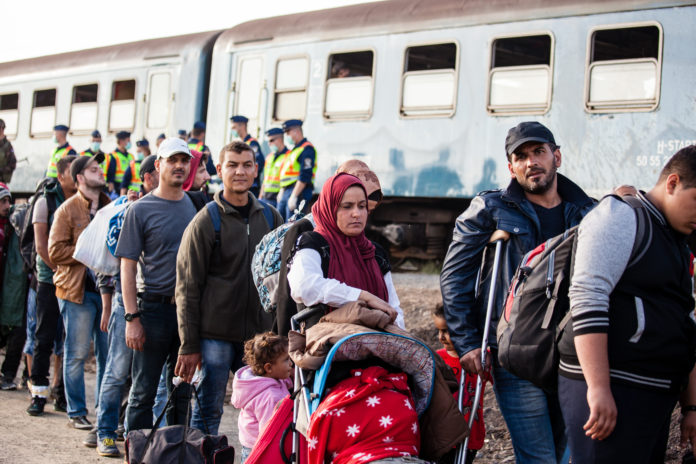
Newfoundland and Labrador will stop holding asylum seekers and other immigrants in provincial jails, which it now does under an agreement with the Canada Border Services Agency (CBSA), becoming the last remaining Canadian province to stop the practice.
Human rights activists are ecstatic.
“Newfoundland and Labrador’s decision is a momentous human rights victory that upholds the dignity and rights of people who come to Canada in search of safety or a better life,” says Human Rights Watch acting disability rights deputy director Samer Muscati.
“With all 10 provinces now having cancelled their immigration detention agreements and arrangements, the federal government should finally guarantee through a policy directive or legislative amendment that the border agency will stop using jails for immigration detention once and for all.”
The Atlantic Canadian province served up notice to the CBSA on March 12 that as of the end of March next year its provincial jails will no longer hold people detained under the Immigration and Refugee Protection Act (IRPA).
Read More Canada Immigration News
Canada Welcomes Growing Numbers Of Ukrainians As CUAET Deadline Looms
Trudeau Refuses Quebec’s Request For Full Power Over Immigration
Start Of 2024 Sees Canada Spousal Sponsorship Immigration Slow
The border agency’s latest data reveals Newfoundland and Labrador only had two detainees under the IRPA in its provincial jails during the last quarter of 2023.
| Detained Migrants By Province in 2022 – 2023 | ||||
| Province | First quarter | Second quarter | Third quarter | Fourth quarter |
| Alberta | 63 | 53 | 61 | 65 |
| British Columbia | 223 | 283 | 309 | 390 |
| Manitoba | 8 | 4 | 9 | 14 |
| New Brunswick | 7 | 3 | 10 | 6 |
| Newfoundland and Labrador | 2 | 0 | 4 | 2 |
| Northwest Territories | 0 | 0 | 0 | 0 |
| Nova Scotia | 1 | 1 | 2 | 3 |
| Ontario | 644 | 574 | 786 | 744 |
| Prince Edward Island | 0 | 0 | 0 | 0 |
| Quebec | 435 | 525 | 490 | 477 |
| Saskatchewan | 13 | 2 | 5 | 5 |
| Yukon | 0 | 0 | 0 | 1 |
The greatest number of detainees in provincial jails during that last quarter of the CBSA’s fiscal year 2022 – 2023 were in Ontario, British Columbia, and Quebec. At that time, Quebec was holding 477 detainees, Ontario 744, and British Columbia 390.
Watch Video
“Our detention applies across the entire immigration spectrum. It’s not just refugees. It’s not just people applying for asylum. It’s anybody in the immigration continuum,” CBSA vice-president of intelligence and enforcement Aaron McCrorie reportedly told CBC News earlier this year.
“We do not detain asylum seekers at all unless we don’t know who they are, unless they pose a risk to the public.”
| Most Detainees Considered Unlikely To Appear | ||||
| Grounds for detention | First quarter | Second quarter | Third quarter | Fourth quarter |
| Danger to the public | 7 | 7 | 12 | 15 |
| Examination | 98 | 85 | 75 | 178 |
| Identity | 68 | 140 | 154 | 112 |
| Security certificate | 0 | 0 | 0 | 0 |
| Suspected inadmissibility on grounds of human/international rights violation | 1 | 0 | 0 | 0 |
| Suspected inadmissibility on grounds of security | 2 | 1 | 4 | 2 |
| Suspected inadmissibility on grounds of serious criminality / criminality / organized criminality | 31 | 40 | 45 | 32 |
| Unlikely to appear / danger to the public | 90 | 104 | 152 | 168 |
| Unlikely to appear | 1,102 | 1,065 | 1,175 | 1,161 |
British Columbia became the first Canadian province to take steps to stop the practice of housing migrants in provincial jails for the CBSA in 2022.
Amnesty International Called Holding Migrants In Provincial Jails Outrageous
Human rights activists had been calling on Ottawa to end the housing of IRPA detainees in provincial jails across Canada for years, saying the practice is both discriminatory and harmful.
Amnesty International reported one person died in immigration detention on Dec 25, 2022.
Under the IRPA, migrants can be and are kept in these provincial jails across Canada even when they are not accused of a crime.
That led Human Rights Watch and Amnesty International to team up to fight the detention of newcomers in provincial jails across Canada through the #WelcometoCanada campaign.
These people were held in small spaces and were under constant surveillance and, in provincial jails, many are confined in dangerous environments where they might be subjected to violence, the campaign claims.
“It’s extremely shocking, it’s even outrageous that we can treat human beings this way in a country like Canada,” France-Isabelle Langlois, executive director of Amnesty International Canada’s francophone branch, reportedly told the CBC.

